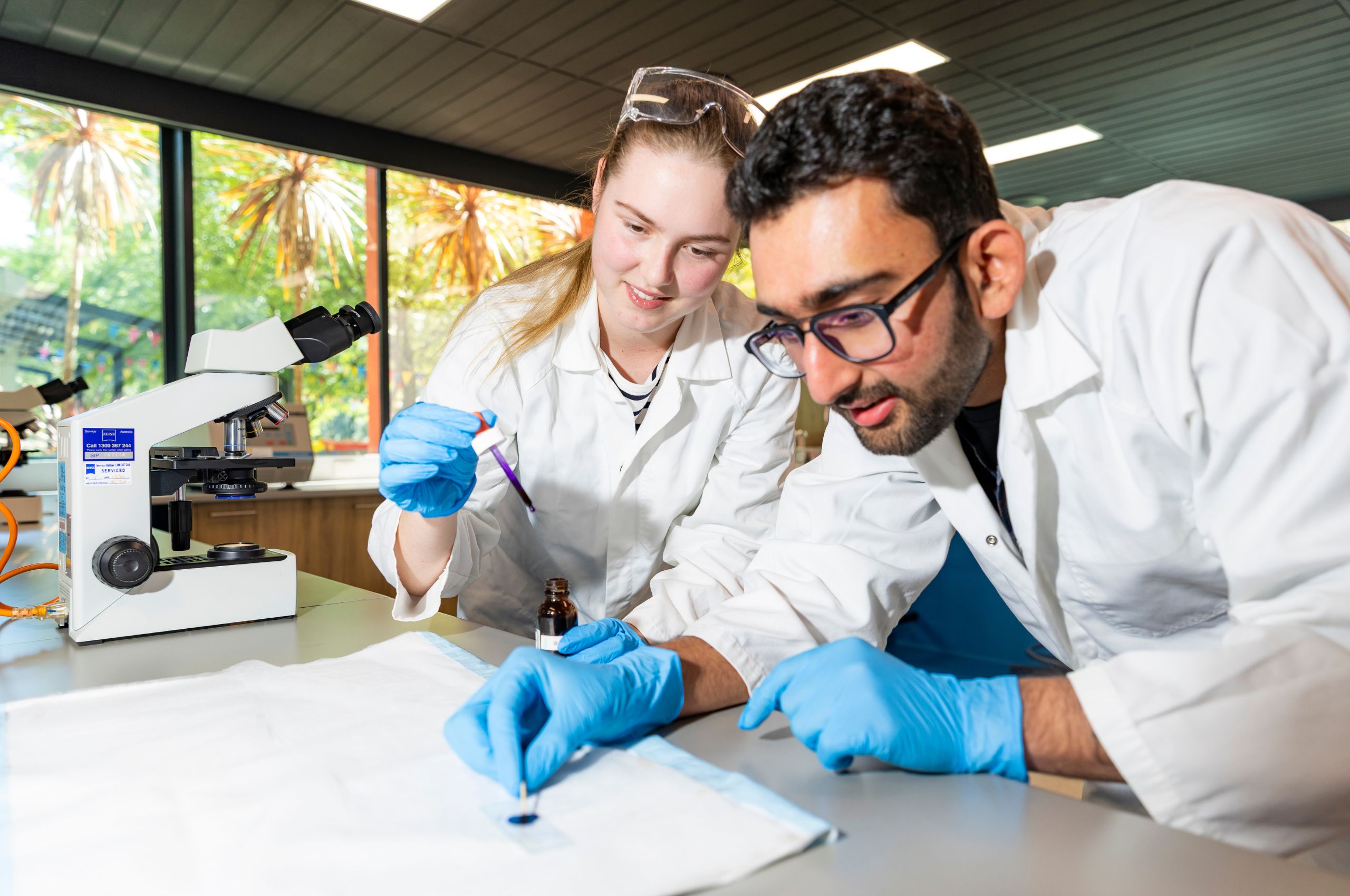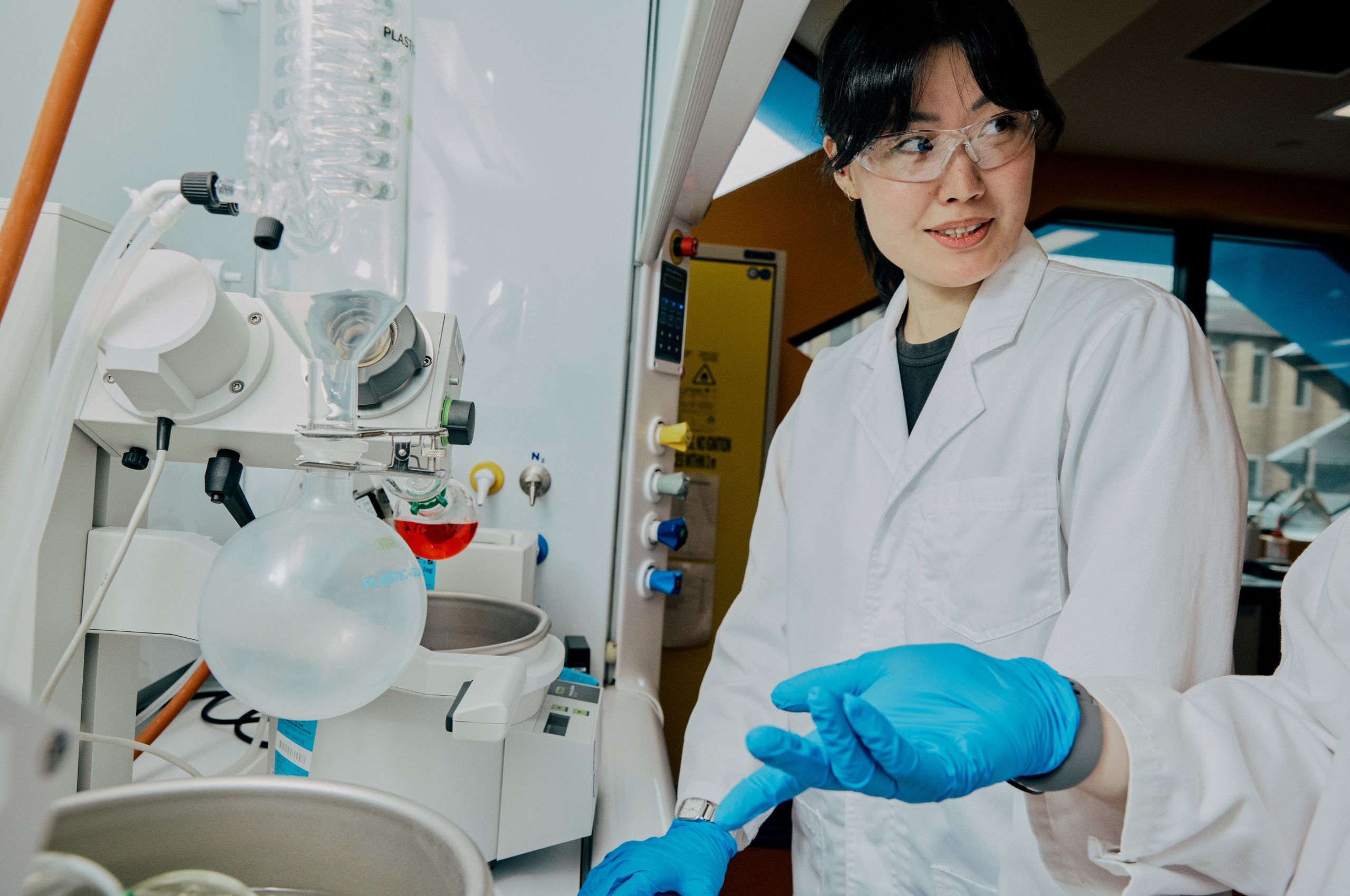About the School of Agriculture, Biomedicine and Environment

La Trobe’s School of Agriculture, Biomedicine and Environment cultivates healthy food, healthy people and healthy ecosystems through excellence and innovation in education and research.
Comprising four departments – the Baker Department of Cardiovascular Research, Translation and Implementation, the Department of Biochemistry and Chemistry, the Department of Ecological, Plant and Animal Sciences, and the Department of Microbiology, Anatomy, Physiology and Pharmacology – our goal is to advance knowledge and develop solutions to food security, the rise of chronic and infectious diseases, and the impacts of environmental change.
We achieve this through teaching and research in the biological, biomedical, environmental, molecular and chemical sciences disciplines.
Our courses are flexible, contemporary, interdisciplinary and industry engaged. We work hard to achieve the right balance of theoretical and practice-based teaching that leads to strong graduate outcomes.
Our research is transformative. We have over 120 research groups and are the only School in Australia to combine biological, biomedical, molecular, chemical and environmental sciences.

We are harnessing the research capabilities of our departments, the focused efforts of our institutes and research centres, and, with our industry partners, are working to maximise opportunities for high impact discoveries and research translation.
Research-informed education
We deliver education programs that are underpinned by current research and practice, where students learn from discipline experts in state-of-the-art facilities or superb natural habitats.
Our courses are taught at La Trobe’s Melbourne (Bundoora) and Albury-Wodonga campuses.
We teach across a broad range of disciplines including agriculture, botany, soil science, animal science, plant science, ecology, evolution and genetics, conservation biology, zoology, microbiology, physiology, pathophysiology, pharmacology and anatomy, biochemistry, chemistry and cardiovascular physiology.
We embed laboratory and field-based experiences into our courses to ensure that theoretical learning is augmented by sustained, hands-on training.
Students also have access to our world-class facilities – including those at the La Trobe Institute for Molecular Science and the Nangak Tamboree Wildlife Sanctuary – to offer them opportunities for skills development in emerging practices and technologies.
Research with impact
The School of Agriculture, Biomedicine and Environment has recognised research expertise in biological, biomedical, environmental, molecular and chemical sciences.
Our outstanding research environment gives academics access to the facilities and infrastructure needed to make significant discoveries.
We work collaboratively with our partners in industry, clinical organisations, philanthropy and government to achieve research outcomes that have a positive impact on the communities we serve.
We bring together the right capabilities, manage projects efficiently, act with integrity, and turn research results into translational outcomes.
Our School is leading two ARC Industrial Transformation Research Hubs – the Research Hub for Molecular Biosensors at Point-of-Use and the Research Hub for Protected Cropping. Our staff are also members of the ARC Centre of Excellence Plants for Space and the Mallee Regional Innovation Centre.
Meet our executive
The School of Agriculture, Biomedicine and Environment is led by an executive team that understands the importance of an industry-focused education and transformative research outcomes. Read more about their careers and find out about their most recent publications.
Research Centres and Institutes
The School of Agriculture, Biomedicine and Environment is home to two flagship institutes and six research centres.
Chemical sensors and biosensors provide essential information about our chemical and biological environment. They enable better quality of life through accurate and personalised medical diagnoses, efficient energy use, better industrial processes, safer and more ethical food and a cleaner environment.
The Biomedical and Environmental Sensor Technology Research Centre is developing the next generation of sensor technology, from health and disease diagnosis, to sensing for transport and energy networks.
Comprising 15 research divisions and more than 75 staff and Higher Degree by Research students, the Centre for Cardiovascular Biology and Disease Research is one of the largest groups of cardiovascular researchers in Australia. Our researchers investigate the mechanisms that cause diseases including hypertension, stroke, atherosclerosis, heart failure, diabetes, vascular dementia and kidney disease. The long-term goal of this research is to develop more effective medicines and diagnostics to reduce the global burden of cardiovascular disease and stroke.
Extracellular vesicles are cell membrane-derived particles that are produced by cells and play key roles in cell-to-cell communication in physiological and pathological settings.
The Centre for Extracellular Vesicles explores extracellular vesicles and their critical role in cell and tissue communication. It is a unique hub for national and international collaborators and industry partners to undertake research, learning and engagement.
The Centre for Freshwater Ecosystems brings together a wealth of expertise in freshwater science and water management to understand and help solve the challenges in sustaining healthy freshwater ecosystems.
Researchers at the La Trobe Institute for Molecular Science are solving some of the world’s more critical problems at the interface of health and science. Co-located in world-class facilities at La Trobe’s Bundoora campus, scientists specialise in four areas of research strength: Cancer, infection and immunity, molecular design and nanoscience. A dedicated fellowship program ensures the Institute supports early career researchers with outstanding potential.
The La Trobe Institute for Sustainable Agriculture and Food specialises in research on seed production, food and health. It fosters collaboration between agri-food and health sectors to promote emerging technologies and research, creating an innovative, multidisciplinary environment. The Institute also focuses on training a skilled workforce and promoting sustainable agricultural production systems.
The Reseach Centre for Applied Alpine Ecology specialises in all aspects of the ecology of alpine and sub-alpine landscapes in Australia including ecological processes, rare and endangered species conservation, effects of fire, exotic plants and animals, human activities, and the management of these ecosystems in response to climate change.
The Research Centre for Future Landscapes generates knowledge and solutions that address the global challenge of sustaining and restoring natural ecosystems in modified landscapes, and empowering people and communities to create more sustainable landscapes.

SCHOOL STRATEGY
Discover our strategic goals. Learn more about our commitment to innovation and excellence in La Trobe's School of Agriculture, Biomedicine and Environment.
